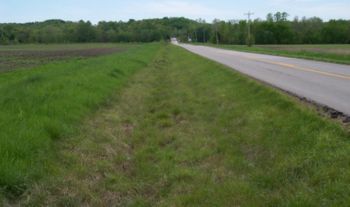821.17 Plant Growth Regulators (PGRs)


Definition: Plant Growth Regulators (PGRs) are to be used for control of seedhead production on healthy, established stands of cool-season grasses (fescue, bluegrass, etc.). A broadleaf weed herbicide must be applied with PGR for desired results. . Application should be done before June 1.
Why:
1. Saves time
2. Reduces mowing cycles
3. Reduces area needed to mow.
4. Improve worker and public safety
5. Allows crews to work on other needed projects
6. Saves money spent on mower and tractor repairs
Primary Sites:
1. Hard to mow routes
2. Sight distance
3. Behind guardrail
Optional Sites:
1. Shoulder of NHS and Interstate routes
2. Signposts
Methods:
A. Calibration of equipment before any application
B. Use recommended products and rates
Table 821.17 Plant Growth Regulators (PGRs)
| Herbicide | Broadcast Rate | Handgun Rate | Comments |
|---|---|---|---|
| Plateau and Escort XP | 3-5 oz. per acre | - | Do not spray with handgun. Do not exceed rates. Application needs to be after green-up. |
| Plateau and 2,4-D or Garlon 3A | 3 – 5 oz. per acre on Plateau and 2 qts. per acre on 2,4-D or Garlon 3A | Do not spray with handgun. Do not exceed rates. Application needs to be after green-up. | |
| Plateau and Milestone | 3-5 oz / acre and 5 oz. acre | Do not spray with handgun. Do not exceed rates. Application needs to be after green-up. | |
| Plateau and Milestone and Escort | 3-5 oz / acre and 5 oz. acre and ¼ - 1/3 oz. per acre | Do not spray with handgun. Do not exceed rates. Application needs to be after green-up. | |
| Plateau and Perspective and Escort | 3-5 oz / acre and 5 oz. acre and ¼ - 1/3 oz. per acre | Do not spray with handgun. Do not exceed rates. Application needs to be after green-up. | |
| Plateau and Perspective | 3 – 5 oz. / acre and 5 oz. per acre | Do not spray with handgun. Do not exceed rates. Application needs to be after green-up. | |
| Adjuvants are to be applied according to manufacturer label. | |||
C. PPE: Follow manufacturers label recommendations
D. When to Apply:
1. 1. PGRs should be applied in the spring, when grass is ~ 80 - 100% green. It is difficult to set a date to begin, every spring is slightly different. Mid-March to early April is generally when applications can begin. The areas in the south can usually begin before the areas in the north. Application should NOT be made after June 1 due to fescue grasses will be going into dormancy and the effect will be minimal.
2. PGR applications should be completed before cool season grasses begin to boot (form seed head).
3. PGR can be applied after mowing to provide a more uniform appearance and address late season broadleaf weeds. Wait 7 to 10 days to let the cut grass heal and new leaf growth on the broadleaf weeds for the application to be effective.
E. How to Apply: Broadcast methods only:
1. BoomBuster Nozzle
2. Neutating Head - Injection Spray Units
3. Spray bar (least effective, due to obstacles)
4. Never use a handgun to apply PGRs.
Special Recommendations:
A. Read the label.
B. Location Concern
1. Not to be applied over standing, running or open water
2. When using growth regulators, a slight yellowing of treated grass may be experienced for a period of time after application.
3. Only established stands of grass can be treated. Newly seeded areas (ex. recent construction) must have at least one full growing season before treated with PGR.
4. Do not apply PGR in front of homes that regularly mow the r/w. The combination of the herbicide and repeated short mowing will cause significant damage to the grass.
5. Avoid direct applications to the side of ditches and cuts. This can result in brown strips where a concentration of herbicide is applied. Use electric cylinder to raise/lower boom angle as needed.
6. Make sure to get the edge of the pavement wet with your application. This will ensure that the chicory, which is common on the edge of pavement, is controlled.
7. Desired width for minor routes should be approx. 10 - 15 ft..
8. Desired width is applying to NHS routes should be no more than 20 ft..
9. Severe infestations of weeds and brush should be controlled before using PGRs. Healthier stands of grass respond to PGR applications best.
10. Release of warm-season grasses (switchgrass, bluestem, etc.) may result.
C. Weather
1. Avoid drift.
2. Applications should not be made if there is rain in the forecast. Use good judgment.
D. Clean up and Disposal
1. 1. Sedimentation can be concern with metsulfuron-methyl (Escort) and Perspective in the tank. It will settle without agitation. Water-Soft may be used to keep it suspended.
2. Mix only amounts that can be applied immediately. Avoid storing mixed product overnight.
E. Mode of Action
1. Plateau and Escort XP are both plant growth regulators. They can only be applied as post-emergent control.
2. Plateau is used to suppress seed head production of cool-season grasses. Escort XP, Perspective, 2,4-D, and Milestone are used for control of broadleaf weeds. Plateau and broadleaf herbicides must be applied together to achieve desired results.
3. University research studies have shown applications after May 10 are ineffective. Glyphosate, although effective, generates too much turf damage. Plateau alone can be used for seed head suppression ONLY if broadleaf weeds are controlled or eliminated prior to application.